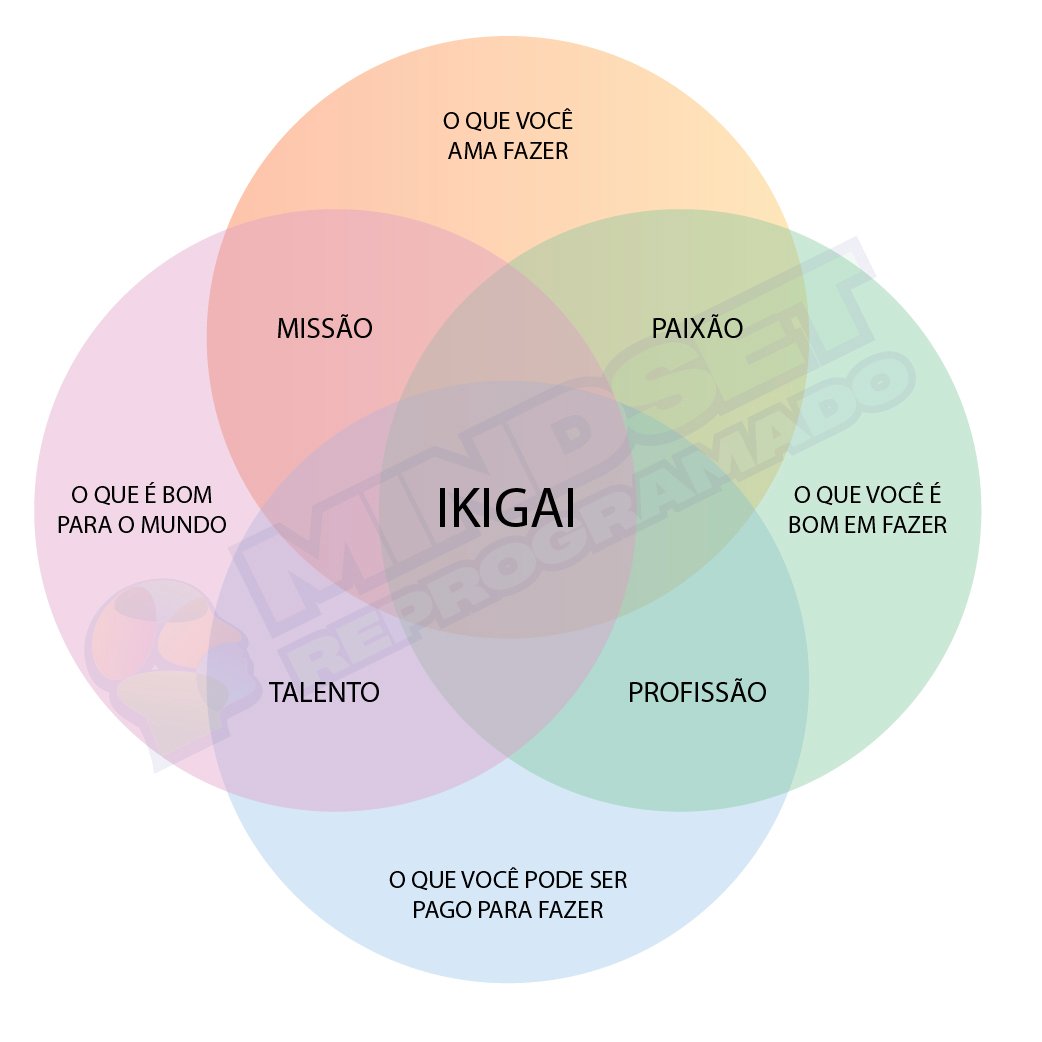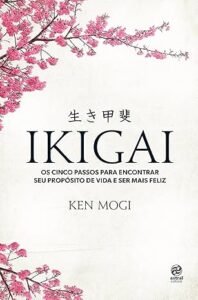Ikigai: discover your purpose and live with more meaning and fulfillment

|
Getting your Trinity Audio player ready...
|
Have you ever felt like you're living on autopilot? Waking up, working, completing tasks... and still feeling like something's missing? This is more common than it seems. And no, it's not "a whim" or "existential drama." In fact, it's the clearest sign that your purpose is dormant.
This internal restlessness is what the Japanese translate with the word Ikigai — a combination of “iki” (life) and “gai” (reason or value). In other words: the Ikigai is the reason you wake up every day.
Rediscovering this reason can be the turning point between a meaningful life and a merely functional one. And that's exactly what we'll explore in this article.
What is Ikigai? Understanding the Japanese concept of purpose
Ikigai is the Japanese concept that represents the intersection of passion, talent, mission, and profession. Much more than a simple philosophy of life, it is a map for self-knowledge and a powerful tool for achieve balance emotional and deep fulfillment.
However, we're not talking about a magic formula or a list of goals to achieve, but rather a way of living more consciously. It's when you can align what you love to do, what you're good at, what you can get paid for, and what the world needs.
This integration is the real secret of a life with purpose — and the best part is that anyone can find their Ikigai, regardless of age or stage of life.
The Origin of Ikigai: Okinawa, Longevity, and Ancestral Wisdom
The concept of Ikigai was born in Japan, more specifically on the island of Okinawa, one of the five so-called blue zones of the planet—regions where people live longer and with a higher quality of life. There, residents have some of the highest life expectancies in the world and, curiously, rarely retire in the Western sense of the word.
But what's different about them? The secret lies in their mindset: they live with a strong sense of purpose, that is, with Ikigai.
For Okinawans, there's no such thing as "stopping working" simply because you reach a certain age. This is because their work isn't a burden, but an expression of what gives life meaning. From an early age, they learn that each person has something unique to offer—and that putting this into practice daily is essential for physical, emotional, and spiritual health.
Furthermore, Ikigai is intrinsically linked to a simple lifestyle, connection with the community, respect for elders, and appreciation for the small joys of everyday life. Cooking calmly, tending the garden, talking to neighbors, practicing... Tai Chi in the park… all of this, for them, has a purpose.
“Ikigai originated in Okinawa, where longevity and purpose go hand in hand — living longer is a consequence of living with meaning.”
This ancient philosophy, combined with an active and connected life, shows that Ikigai is not just a modern tool for self-knowledge — it is an ancient way of living wisely.
The Four Pillars of Ikigai and How They Connect
The Ikigai framework is made up of four main areas. Their intersection reveals its deeper purpose:
What do you love?
This is the starting point. What makes your heart sing? What would you do even if no one was watching or paying you for it? Love here isn't just affection—it's vital enthusiasm.
What are you good at?
We don't always love what we're naturally good at, and vice versa. Therefore, discovering our innate (or developed) talents is essential to understanding how we can contribute uniquely.
What you can get paid for
Purpose doesn't have to exclude remuneration. In fact, a sustainable Ikigai includes an activity that can generate income—this keeps the cycle running smoothly.
What the world needs
This is the connection to something greater. In this sense, a true purpose transcends the ego and finds relevance in the collective. What transformation would you like to bring about in the world?
When these four elements intersect, Ikigai emerges — and with it, a rare feeling of existential clarity.

How to discover your Ikigai: a practical step-by-step guide
Many people ask: “How do I discover my Ikigai in practice?”
Here's a simple but in-depth step-by-step guide:
- List everything you love (activities, topics, hobbies, areas that excite you).
- Write down what you are good at (natural abilities, feedback received, recognized talents).
- Think about what people would pay you to do (consulting, services, products, etc.).
- Write down what the world needs and what you care about (causes, social issues, changes you want to see).
Then look at the intersections between these four groups. Where there are intersections, there is power.
“Ikigai is not something you find all at once, but something you build step by step, listening to yourself with presence and courage.”
Why is it so hard to find purpose these days?
We live in a time where productivity is valued more than presence. Thus, society pushes us toward pre-defined paths: a good college, a stable job, a 'proper' life... and, often, we forget to ask ourselves: “Does this really make sense to me?”
Furthermore, social media has created a toxic type of constant comparison. And when we compare ourselves to seemingly perfect lives, our own purpose seems small, unclear, or even nonexistent.
That's why finding Ikigai requires inner silence, not external likes.
Ikigai in practice: how to live aligned with your purpose every day
Discovering your Ikigai is just the first step. Therefore, the real challenge is living in alignment with it every day. This requires:
- Conscious choices: saying “no” to what disconnects you and “yes” to what expands you.
- Emotional self-care: dealing with self-sabotage and procrastination cycles.
- Consistent actions: purpose manifests itself in attitudes, not just in thoughts.
If you want a life of purpose, you need to nurture that purpose daily, like cultivating a rare plant.
The integration between Ikigai, Mindfulness, NLP and Positive Psychology
Ikigai becomes even more powerful when combined with self-development practices:
- Mindfulness allows you to listen to your intuition and be present in your choices.
- NLP helps you reprogram limiting beliefs that block your true calling.
- Positive Psychology focuses on your personal strengths and building a lighter, happier path.
“Combining Ikigai with practices like mindfulness and NLP transforms purpose into action with clarity, focus, and fulfillment.”
Where Purpose Often Goes Awry—and How to Find It Again
Ikigai often goes awry when we get caught up in cycles of comparison, fear, or excessive responsibility. Sometimes, we stop pursuing what we love because we think it "won't make money." Other times, we disconnect from what the world needs because we're too focused on survival.
If this has happened to you, that's okay. Ikigai is flexible and can (and should) be revised. Therefore, it's not something fixed, but a compass in constant adjustment.
Want to find your way again? Ask yourself:
What gives me energy?
What brings me peace?
What would I do if I wasn't afraid?
Purpose is not found, it is built (with awareness)
In short, Ikigai isn't a destination. It's a process. Therefore, it doesn't fall from the sky, but emerges when you connect with who you truly are—without masks, without rushing, without external approval.
Living with purpose is a daily choice. A choice for more truth, more lightness, and more meaning. Therefore, with the right tools—like NLP, mindfulness and positive psychology — you have everything you need to follow this path.
FAQ – Frequently Asked Questions about Ikigai
1. Is Ikigai just about work?
No. While it involves professional aspects, Ikigai encompasses everything that gives meaning to your existence—including relationships, hobbies, and social contributions.
2. How do I know if I have found my Ikigai?
You feel lightness, enthusiasm, and clarity. However, it's not an absence of effort, but a presence of purpose. You wake up with a zest for life, even in the face of challenges.
3. Can I have more than one Ikigai?
Yes! Many people have more than one area that connects their four pillars. Furthermore, your Ikigai can evolve with you over time.
4. Is there an ideal age to discover Ikigai?
No. It can be discovered at 20, 40, or 70. After all, it's never too late to live with more meaning.
5. Can Ikigai help overcome the purpose crisis?
Absolutely. It offers a practical and emotional framework for reconnecting you to what truly matters—and that transforms everything.
Recommended Reading:
Ikigai: The Five Steps to Finding Your Life Purpose and Being Happier – by Ken Mogi
Image: Freepik

Marcel Castilho is an expert in neuromarketing, neuroscience, mindfulness and positive psychology. In addition to being an advertiser, he also has a Master's degree in NLP – Neurolinguistic Programming. As the owner and founder of the communications agency VeroCom and also of the digital agency Vero Contents, he has been studying human behavior for over 30 years.



